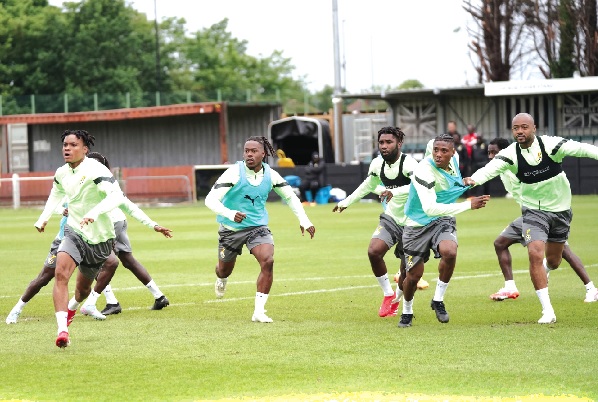At the Gtech Community Stadium in Brentford last Wednesday, the scoreboard read Nigeria 2-1 against Ghana. But for many Ghanaians watching from the stands or behind screens back home, the result told only a fraction of the story.
What unfolded on the pitch was more than just a football match—it was the unveiling of a new generation of Black Stars.
Coach Otto Addo’s youthful side, missing key names such as Mohammed Kudus, Thomas Partey, Inaki Williams and Antoine Semenyo, stood toe-to-toe with a more experienced Nigerian team in the semi-final of the Unity Cup.
For most fans, it wasn’t about the loss—it was about the performance, the passion and the promise of a brighter future for Ghanaian football.
Performance beyond scoreline
The young Black Stars didn’t just play—they impressed. They controlled large portions of the second half, launching waves of attacks, creating chances and showing composure beyond their years.
These were not just replacements; they were players auditioning for permanent roles and they delivered with heart.
Debutants Aaron Essel and Christopher Bonsu Baah, though relatively unknown on the international stage, looked right at home in Ghana’s colours. Essel, who plies his trade with North Texas in the US MLS, was composed in defence, showing strength in duels and calmness under pressure.
Bonsu Baah, who plays for Genk in Belgium, brought flair and intelligence to the midfield, linking play and keeping Nigeria on their toes.
Then came Caleb Yirenkyi, the 19-year-old sensation from FC Nordsjælland. Introduced in the second half, he immediately brought urgency and dynamism to Ghana’s attack.
His marauding runs down the flank and audacious footwork earned roars from the crowd and admiration from pundits. If there was ever a coming-of-age moment for a young player in a national jersey, this was it.
Brendon’s breakthrough, Simpson’s strength
Cov, entry City’s Brendon Thomas-Asante, no stranger to the national team, finally got his moment—his debut goal. It was a reward for his relentless efforts, a goal that symbolised determination and self-belief.
It was also a message to the technical handlers that, given time, players like him can deliver.
At the back, Nations FC’s Razak Simpson played with the maturity of a seasoned defender. Despite scoring an unfortunate own goal, his performance was nothing short of exceptional.
He read the game well, intercepted with precision and ensured that Nigerian forward Kelechi Iheanacho had a frustrating evening. Simpson’s ability to organise the backline and remain composed under pressure is a quality Ghana will need in future tournaments.
Integration and opportunity
This match reignited an old debate among fans and analysts: Why aren’t more young players seamlessly integrated into the senior national team?
For years, Ghanaian football has struggled with inconsistency in team selection and the abrupt inclusion and exclusion of promising players. The Unity Cup match showed that with the right exposure, these players are not just capable—they are essential.
It also reaffirmed the importance of non-competitive matches in building the next generation of stars. Friendly matches and developmental tournaments should be used as platforms for growth, not just experiments.
What Otto Addo’s young team showed was not just technical ability, but a refreshing identity—a hunger, a willingness to fight for every ball and a sense of pride in wearing the jersey. These traits cannot be taught in training; they are born out of opportunity and belief.
The Unity Cup may not be a FIFA tournament or a World Cup qualifier, but for Ghana, it may have signalled the beginning of a footballing renaissance.
Yes, the Black Stars lost 2-1. But what Ghanaians saw was far more valuable than a trophy—they saw the future. A future filled with grit, energy and raw talent waiting to be refined.
If harnessed properly, these young players could become the spine of a new, dynamic Ghana team.

